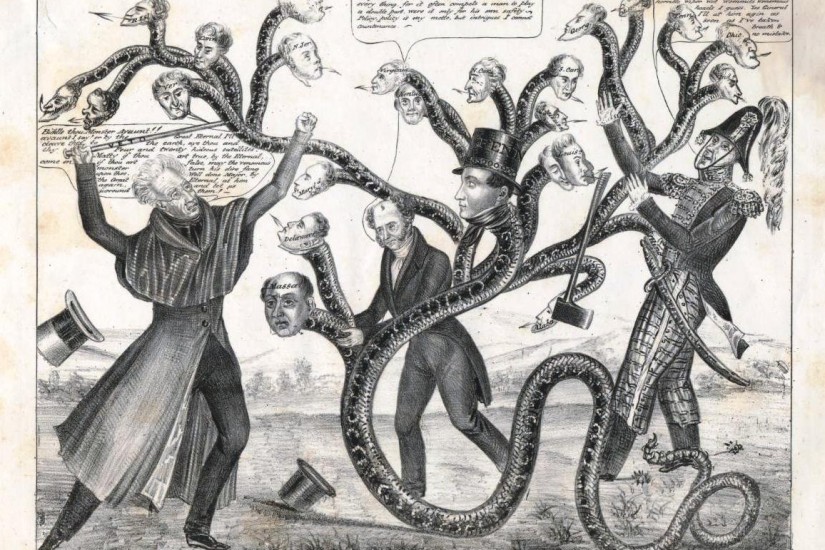Conspiracies appeared even at the founding of the country, when, during the early decades of the American republic, the Federalist and Jeffersonian Republican Parties engaged in conspiratorial rhetoric on a regular basis. Following the War of 1812, the Federalist Party faded, leaving the Republicans as the predominant national party. Their hold was so great that in 1816 and 1820, James Monroe, the Republican presidential candidate, ran virtually unopposed. In 1824, however, the Republicans splintered into factions. Five viable candidates ran in that election cycle, and John Quincy Adams won the presidency.
The controversy around Adams’s victory quickly fueled suspicions: Tennessean Andrew Jackson had won the most electoral and popular votes and the most regions and states, but because he did not win the majority of electoral votes, the U.S. House of Representatives was constitutionally required to choose the president in a runoff of the top three vote-getters. Jackson’s supporters believed that House Speaker Henry Clay, who had placed fourth in the regular election, helped Adams win the House election in return for being appointed secretary of state. The Jacksonians’ charges of a “corrupt bargain” between Adams and Clay ensured that the 1828 election would, in part, be fought over this conspiracy theory.
During the hotly contested 1828 campaign, Jackson’s opponents, too, trafficked in conspiracy theories: In particular, administration men accused Jackson’s supporters of plotting a coup d’état if their candidate lost to President Adams. This “theory” held that pro-Jackson congressmen, upset about the national government’s attempts to impose a new tariff on imports, held “secret meetings” to discuss “the DISSOLUTION OF THE UNION.” One pro-Jackson supporter “declared that he should not be astonished to see Gen. Jackson, if not elected, placed in the Presidential Chair, at the point of fifty thousand bayonets!!!” The thought of a national military hero such as Jackson leading a military rebellion had no basis in reality, but the conspiracy theory fit the tenor of the times.
Jackson won—and conspiratorial rhetoric remained ever-present in his presidency. In the run-up to the 1832 election, for example, the national organization of Freemasonry drew conspiracy theorists’ attention. Spurred on by the murder of a New York Mason named William Morgan, who had threatened to disclose the fraternal order’s secrets, an Anti-Masonic political party had emerged during the 1828 election. Frequently repeated accusations that Freemasonry was secretive and elitist reflected larger concerns about the ways in which the ruling elite undermined the nation’s democratic institutions through corruption. And for the Anti-Masons, Jackson was no better than Adams; in their view, the Tennessean’s promise of “rotation of office” was simply cronyism.
